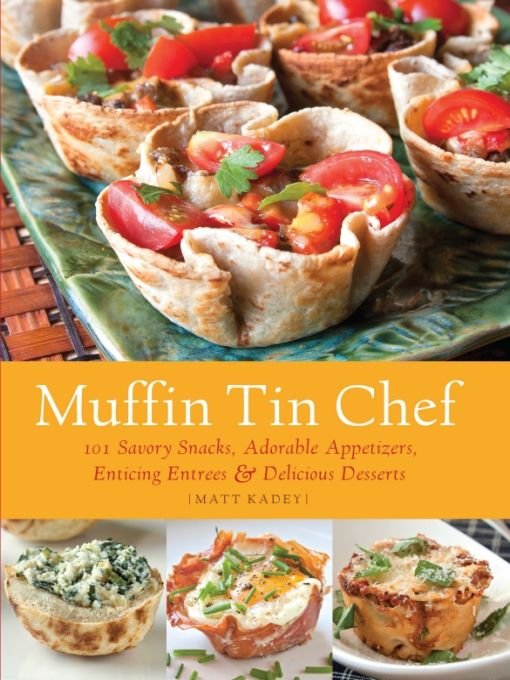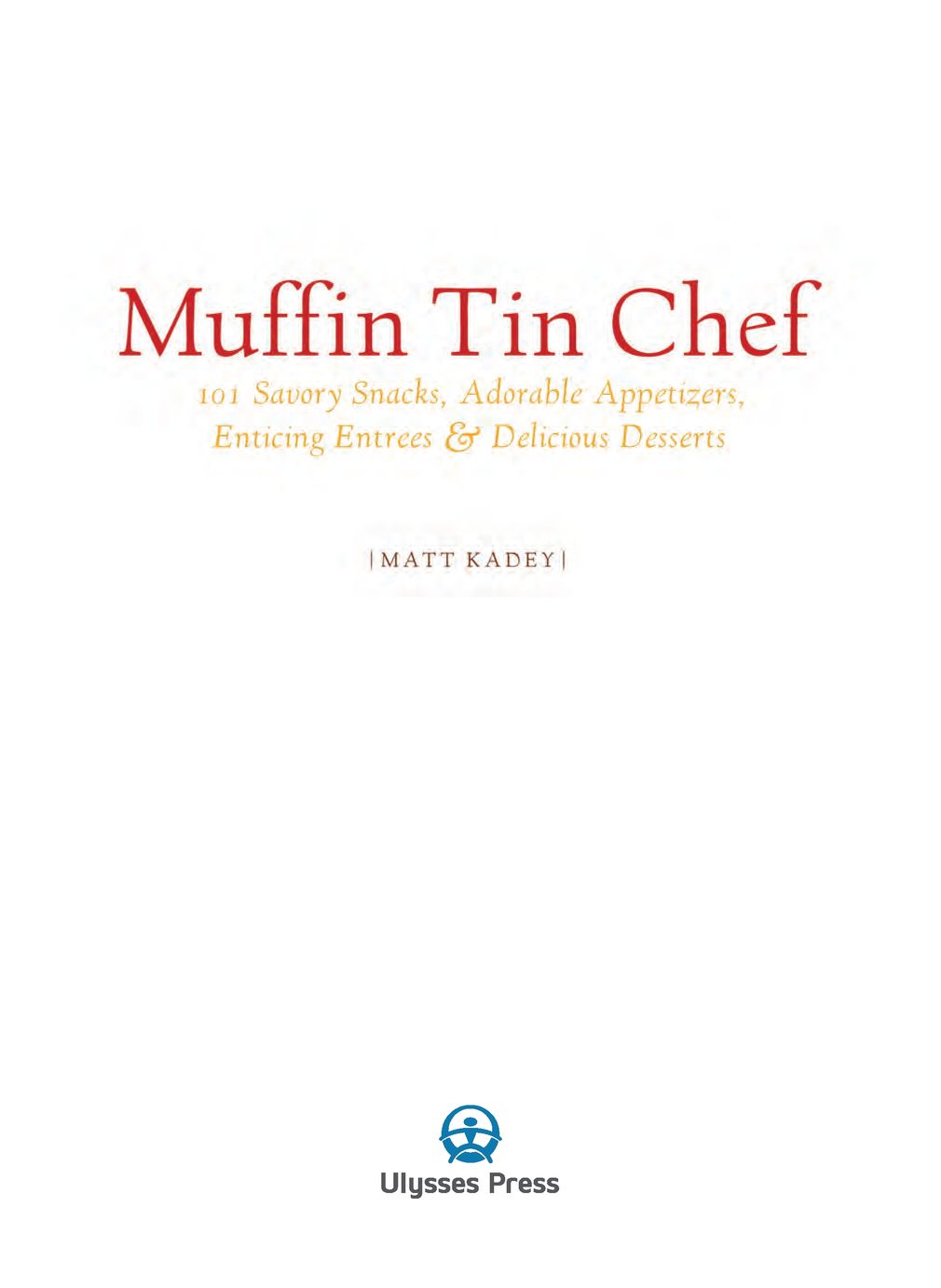Muffin Tin Chef
Authors: Matt Kadey



Table of Contents
Â
Â
Â
Â
Â
Â
Â
INTRODUCTION
The Muffin Pan Can
So how does a male dietitian come to write a cookbook devoted to muffin tins? Well, it started with a magazine assignment I was given a few years ago to develop several recipes using the trusty muffin tin with one big stipulation: no muffins! At that point, muffins were all I had ever used one for. However, as I started to research recipes, I quickly uncovered a plethora of savory and sweet possibilities. In fact, the muffin pan is a kitchen workhorse if there ever were one. Don't let the name fool you; they're good for much more than rustling up a batch of muffins or cupcakes. After the assignment, I found myself breaking out the can-do pans more and more often for everything from individual quiches to pancakes. Here's why you should, too:
Â
FAST AND FURIOUS.
In many instances, cooking items in a muffin tin can significantly slash cooking time. Take mini meatloaves, for example. In a loaf pan, a meatloaf can take up to 1 hour to bake, but break up the portions into muffin cups and you can be feasting in half the time. Ditto for cakes and quick breads. This also helps cut down on energy usage, helping you save a few bucks and live a little greener.
In many instances, cooking items in a muffin tin can significantly slash cooking time. Take mini meatloaves, for example. In a loaf pan, a meatloaf can take up to 1 hour to bake, but break up the portions into muffin cups and you can be feasting in half the time. Ditto for cakes and quick breads. This also helps cut down on energy usage, helping you save a few bucks and live a little greener.
BUILT-IN PORTION CONTROL.
In a time when obesity is such a major concern, muffin tin meals are ideal for keeping portions in check. A recipe such as muffin-size frittatas may call for a cup of cheese (I mean, hey, isn't everything
better with cheese?), but when the portion is just two individual frittatas, suddenly your fat and calorie intake is well within reason so your waistline won't bulge postprandial.
In a time when obesity is such a major concern, muffin tin meals are ideal for keeping portions in check. A recipe such as muffin-size frittatas may call for a cup of cheese (I mean, hey, isn't everything
better with cheese?), but when the portion is just two individual frittatas, suddenly your fat and calorie intake is well within reason so your waistline won't bulge postprandial.
GREAT FOR KIDS.
Preparing muffin-size items takes advantage of a child's preference for easy-to-grab, hand-to-mouth eating. Personal-size treats such as pizza or mac 'n' cheese are sure to be a hit at the dinner table and in the lunchroom. It's also easy to sneak in a bunch of vegetables that tykes may not be too enthusiastic about eating. And you can get them involved in mixing the ingredients and filling the muffin cups.
Preparing muffin-size items takes advantage of a child's preference for easy-to-grab, hand-to-mouth eating. Personal-size treats such as pizza or mac 'n' cheese are sure to be a hit at the dinner table and in the lunchroom. It's also easy to sneak in a bunch of vegetables that tykes may not be too enthusiastic about eating. And you can get them involved in mixing the ingredients and filling the muffin cups.
ADAPTABLE AND PACKABLE.
Compact and portable, muffin tin meals are more transportable than their full-size counterparts, making them ideal for lunch boxes, road trips, potlucks, and picnics.
Compact and portable, muffin tin meals are more transportable than their full-size counterparts, making them ideal for lunch boxes, road trips, potlucks, and picnics.
LOOKS TO KILL.
If you're looking for an easy meal that will impress a group of family or friends, look no further! Adorable muffin tin meals and snacks are sure to be a conversation topic and make guests coo with delight.
If you're looking for an easy meal that will impress a group of family or friends, look no further! Adorable muffin tin meals and snacks are sure to be a conversation topic and make guests coo with delight.
FROZEN ASSETS.
Stuck with extra chili, chicken broth, tomato paste, or pasta sauce? Instead of tossing these into a zip-top bag or plastic container where they'll form a giant food ice cube, try dividing them into muffin tin compartments. They'll freeze into individual portions that will defrost much quicker than a huge chunk of subzero food. Place items into the muffin cups, freeze until solid, unmold and then store in zip-top bags.
Stuck with extra chili, chicken broth, tomato paste, or pasta sauce? Instead of tossing these into a zip-top bag or plastic container where they'll form a giant food ice cube, try dividing them into muffin tin compartments. They'll freeze into individual portions that will defrost much quicker than a huge chunk of subzero food. Place items into the muffin cups, freeze until solid, unmold and then store in zip-top bags.
MY PERFECT DAY OF MUFFIN-SIZE EATING
If you asked me what my ideal day of noshing on muffin tin goodies would be, I would be in a state of edible bliss with this menu:
Â
Breakfast:
Peach Oatmeal Bake (page 23)
Peach Oatmeal Bake (page 23)
Â
Morning Snack:
Granola Rounds (page 37)
Granola Rounds (page 37)
Â
Lunch:
Savory Smoked Salmon and Cheese Muffins (page 112)
Savory Smoked Salmon and Cheese Muffins (page 112)
Â
Afternoon Snack:
Seedy Rounds (page 38)
Seedy Rounds (page 38)
Â
Dinner:
Taco Cups (page 78)
Taco Cups (page 78)
Â
Dessert:
Extra-Moist Chocolate Cakes (page 122)
Extra-Moist Chocolate Cakes (page 122)
So you see, the muffin tin is undeniably a kitchenware overachiever. I hope you'll join me in the muffin tin revolution.
Tools of the TradeObviously, if you're going to give this book a good workout, you'll need an arsenal of muffin tins. Today, there are more options than ever.
SiliconeLove them or hate them, food-grade silicone muffin cups have a number of things going for them. Virtually nonstick, silicone is a smart choice for items that may adhere with passion to your muffin cups, such as egg-based quiches and frittatas. This cuts down on the need for using paper liners and the waste they create, as well as the need for greasing. I also appreciate that they're flexible, which makes unmolding goodies much less risky and arduous. You'll find this very helpful for recipes such as panna cottas (page 136) and the assortment of frozen treats, including the cappuccino cups (page 148). Being able to turn the cups inside out also makes washing them more manageable. However, you'll need to place silicone muffin trays on a baking sheet before sliding them into the oven to provide stability. Silicone is freezer-, microwave-, and dishwasher-safe, and the variety of cheerfully vibrant colors the trays come in can brighten up a kitchen.
However, there are a few caveats. Some manufacturers claim silicone does not stain. This has not been my experience with the colored trays. This is purely aesthetic and does not negatively affect performance. Silicone doesn't produce crispy pastry like metal or stoneware muffin tins do, so I'll often turn to the latter when making mini pies or other items with a crust. Depending on your preference, keep in mind that items such as cakes and muffins may not rise or brown to the same degree with silicone. Because you can't preheat them like you can with metal, silicone muffin cups are not ideal for recipes such as Yorkshire pudding (page 98) or popovers (page 37) where you want to add the batter to a hot pan.
By far, the best quality silicone muffin trays are the Flexipan ones from Demarle at Home, makers of the widely popular Silpat baking sheet liner. Made with a combination of woven glass and food-grade silicone, the shiny black trays produce better browning, rising, and more even cooking than
other silicone muffin trays and are the most nonstick of the silicone bunch. They also can be rolled for easy storage. Bonus: They come with a lifetime warranty. For best results, Demarle recommends placing their trays on a perforated baking sheet, allowing more contact with the heat of the oven.
Metalother silicone muffin trays and are the most nonstick of the silicone bunch. They also can be rolled for easy storage. Bonus: They come with a lifetime warranty. For best results, Demarle recommends placing their trays on a perforated baking sheet, allowing more contact with the heat of the oven.
Standing the test of time, metal muffin trays remain the preferred choice for many home bakers. I recommend purchasing one made with heavy-gauge steel such as aluminized or stainless, which allow for even heating and produce perfectly browned baked items. When you pick up the pan, you want it to feel solid and have some weight to it. Also, look for a tin with large, wide handles, which make it easier to transport into and out of the oven. Nonstick coating makes unmolding and cleanup easier, but I understand that not everyone trusts that these materials are completely safe. Filling empty metal cups with water can help prevent scorching during baking.
Other books
The Days Run Away Like Wild Horses Over the Hills by Bukowski, Charles
Fast Lane by Dave Zeltserman
Heart of the Lonely Exile by BJ Hoff
Mistress to the Crown by Isolde Martyn
KEEP by Laura Bailey
The Game of Love: (BWWM Romance) by K. Alex Walker
Undeniable by Madeline Sheehan
ANOTHER KIND OF DIAMOND by Gloria Obizu
Nights of Roshan by London, Billy
Mine to Crave by Cynthia Eden